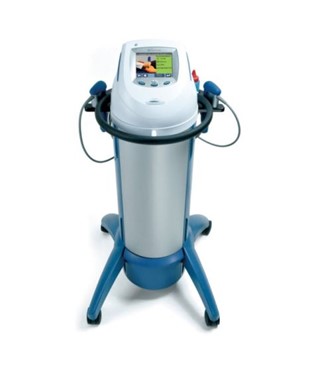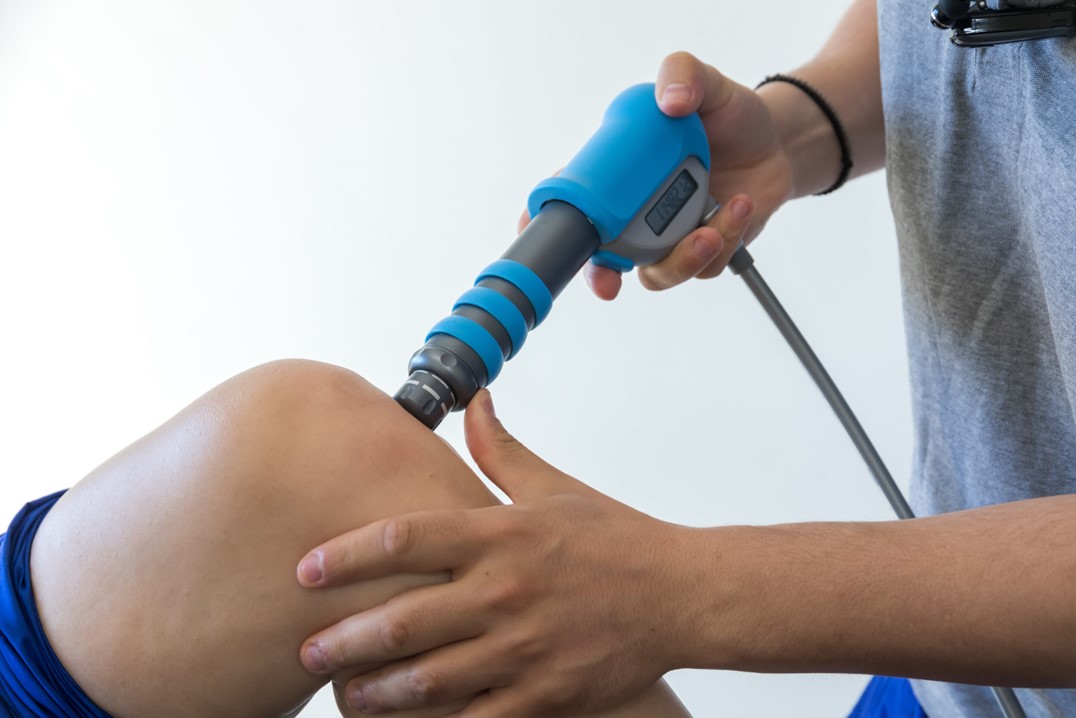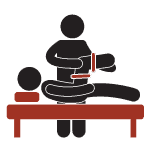Shockwave Therapy at Alliston physio clinic
Contact UsWhat is shockwave therapy?

Shockwave therapy is a common treatment technique used in physiotherapy sessions.
It is a highly evidence-based treatment technique that treats a wide range of issues from tendon pain (tendinitis or tendinopathies) to other common conditions.
These conditions can be seen in many different populations whether an athlete or an office worker.
The main benefits of shockwave therapy are pain relief and restoring function.
How does shockwave therapy work?
Shockwave therapy is a non-invasive treatment that uses a handheld device to deliver mechanical pressure to an injured area. We wont get into the physics of shockwave therapy, however, you can expect your therapist to be holding a shockwave device against an injured area for the duration of the treatment.
With the device sending high-energy soundwaves into the injured area, this will stimulate an increase in blood flow to the area, increase growth hormones to the area and promote an increase in new tissue growth.
This will ultimately help to reduce pain, improve circulation and healing of the damaged tissue.
What injuries can shockwave therapy treat?

- Shoulder pain: rotator cuff tendinopathy, long head of biceps injuries
- Elbow pain: lateral epicondylitis (tennis elbow), medial epicondylitis (golfers’ elbow)
- Hip pain: gluteal tendinopathies
- Knee pain: patellar tendinopathy, quadriceps tendinopathy, hamstring injuries
- Ankle pain: Achilles tendinopathy
- Foot pain: plantar fasciitis
What is the evidence regarding shockwave therapy?
Is shockwave therapy painful?
What are some benefits of shockwave therapy?
1. Reduces pain: many patients have a reduction in their pain intensity after treatment, making shockwave a beneficial option to reduce pain instead of using pain medications
2. Non-invasive: this treatment is non-invasive, meaning it does not require incisions or surgery
3. Improved mobility and activity: many patients report having improved function after sessions of shockwave therapy. This translates into helping them get back to activities they want to get back to (i.e. walking, resistance training, pickleball).
4. A quick treatment option: A shockwave therapy session takes as little as approximately 5-10 minutes
How many sessions of shockwave therapy are needed?

The short answer is – it depends! The number of shockwave sessions can vary depending on multiple factors such as the type of injury, the severity of the injury, the duration of dealing with the injury (i.e. acute vs. chronic), the age and the overall health of the individual. Typically, most individuals will require anywhere from 3 to 6 sessions of shockwave before they see a significant improvement in their condition. With that being said, some individuals will see large improvements in their pain within the first few sessions, however for the entire benefits of shockwave that occur, the total duration of treatment is approximately 12 weeks.
Can shockwave therapy be used as an additive to other treatment techniques?
Shockwave therapy is beneficial for many types of conditions and impairments. If you are suffering in pain from an injury and want to feel better and return to the activities you enjoy, contact one of our therapists if shockwave may benefit you!
MANUAL AND MANIPULATIVE THERAPY
Our therapists use a variety of hands on techniques to both accurately assess and efficiently treat patients. Specialized training through the Orthopaedic Division of the Canadian Physiotherapy Association (orthodiv.org) allows for accurate diagnosis and faster recovery. Fellows of the Canadian Academy of Manipulative Physiotherapists (FCAMPT) have taken extensive post-graduate training and have received international recognition in hands on techniques.
manippt.org
CONCUSSION MANAGEMENT
At South Simcoe Physiotherapy we have training in the Shift Concussion Management Program (shiftconcussion.ca). Using this program as a basis, we thoroughly assess the individual systems often effected in a concussion using a variety of tests, as well as cognitive tools such as imPact. Once an accurate assessment has been performed, we develop a multi-faceted rehabilitation strategy to return the individual to optimal function.
PELVIC HEALTH
massage therapy
Massage therapy is a form of hands in treatment that affects the body’s soft tissues such as the muscles, connective tissue, ligaments, tendons and joints. Massage therapy can have therapeutic effects on the muscular, circulatory, and nervous systems. For more information on Registered massage therapy please visit: www.rmtao.com
acupuncture
Acupuncture is rooted in Traditional Chinese Medicine and uses tiny needles which are inserted into various points in the body. Acupuncture stimulates the body’s natural healing mechanisms and is effective in treating a variety of conditions including headaches, back pain, neck pain, various overuse and sports injuries. Our therapists have training in acupuncture through Acupuncture Canada ( https://www.acupuncturecanada.org)
RUNNING ASSESSMENT / GAIT ANALYSIS
Gait analysis and Running Assessments can be useful in determining biomechanical irregularities during either walking or running that are either causing or are caused by a certain condition or injury. Gait analysis can also help to identify inefficiencies that may be reducing performance in runners and perhaps predisposing or contributing to injury.
We use multiple tools to analyze a person’s gait. First, we use our physiotherapy backgrounds and knowledge of biomechanics. By observing someone walking/running/using the treadmill (and perhaps recording them) we can often identify these major faults. A biomechanical exam can also aid in this process through identifying structural limitations, muscle weakness and tone, and a variety of other potential faults. Finally, using training from courses such as those taught at The Running Clinic https://therunningclinic.com/en, can help to consolidate all of this information while allowing us to make recommendations on items such as footwear, training schedules, and other information relevant to your specific situation.
IMS/IDN
Intramuscular Stimulation and Integrated Dry-Needling. Both IMS and IDN are forms of dry needling where an acupuncture needle is inserted into a taut band in a shortened muscle or near the nerve root in order to cause a reflex relaxation of the muscle, a micro trauma to stimulate natural healing and create an action potential to restore normal nerve conduction. This technique can be extremely useful to treat chronic pain, myofascial pain syndromes, many sports injuries, and overuse injuries. For more information visit: www.istop.org
exercise prescription
Exercise is an essential part of all rehabilitation programs. In order to restore normal muscle length and strength, correct biomechanical faults and return to function, exercises need to be specifically tailored to suit individual needs.
custom bracing
shockwave therapy
Shockwave is a non-invasive way to treat many muscular, tendinous, ligamentous, and bone problems that lead to pain and loss of function. Briefly stated it uses strong energy pulses to stimulate increased blood flow and metabolism allowing regeneration of damaged tissue. A phenomenon called “micro-cavitation” occurs where “bubbles’ expand and burst creating a force that penetrates damaged tissue and stimulates cell reparation. Shockwave is especially effective in treating issues that have been unresponsive to other conservative methods.
VIDEO AND TELEPHONE CONSULTATIONS
At a time when social distancing is necessary, we are pleased to be able to offer our exceptional care in an alternative method. Video consultations (think FaceTime or Skype) can be an effective method to assess and treat musculoskeletal and other physiotherapy appropriate impairments. A thorough analysis can be conducted by performing a detailed subjective, observing individual movements, performing simple tasks and special tests, and evaluating the environmental factors which are aggravating the condition. From there, our therapist can devise an appropriate treatment plan including self management strategies, modifications, and exercises appropriate to address your condition. The therapist is easily able to demonstrate the exercises and observe you performing them, and can even send you video demonstrations of the exercises. For those that are unable to access reliable internet, or do not regularly use a computer, telephone consults are also an option.
No doctor's referral is necessary and these sessions are covered by most insurers
NATUROPATHY
Frequently Asked Questions
What is physiotherapy?
Simply stated, physiotherapy is the treatment of deficits and disease without the use of medications. Physiotherapy is useful for the majority of injuries and ailments one might suffer. The goal of our physiotherapists is to reduce your symptoms and allow you to return to function in a timely manner. If you are unsure if your condition is appropriate for physiotherapy, please feel free to contact us.
How do I pay for your services?
Does OHIP cover physiotherapy?
Do I need a doctor’s referral to come and see you?
What do I need to wear for my assessment?
Will my private insurance cover the cost of this treatment?
What if my injuries are as a result of a motor vehicle accident or workplace injury?
- Date of accident
- Claim number
- Adjuster’s name and contact information
- Private health insurance information (if applicable)
- Area of injury
We are able to direct bill your motor vehicle insurance, but please note that all of your private health insurance must be used prior to accessing your motor vehicle insurance. These rules are mandated by the Financial Services Commission of Ontario and not our clinic.
Workplace injury (WSIB): we often treat people as a result of a workplace injury, however, we do not bill WSIB directly. If your injury is part of a WSIB claim, you are expected to pay just as other clients and then submit your invoices to WSIB.


